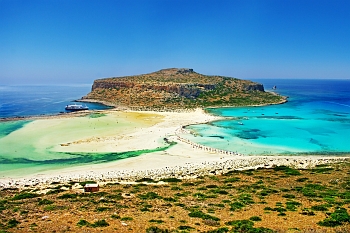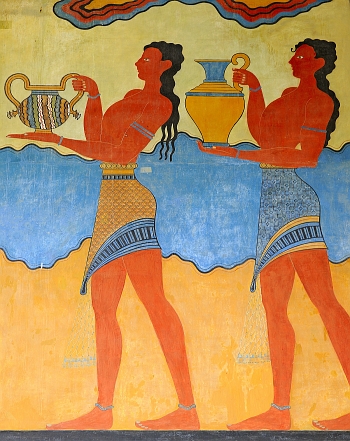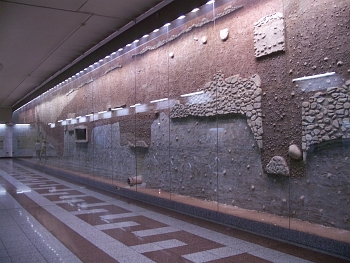First time in Greece? No need to worry about a thing! Before you book what is sure to be the trip of a lifetime, here is what you should know!
This guide contains comprehensive information about Greece and why it should be your next destination. Afterwards, be sure to fill in our special Easy Itinerary Form, where you can enjoy the free guidance of our expert travel agents in order to turn your travel ideas into the tailor-made trip of your dreams.
About the country
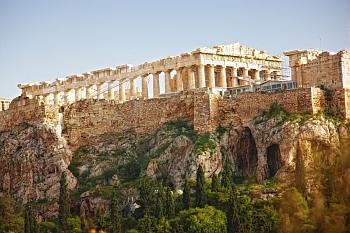 Greece is one of the world's most popular tourist destinations, consistently ranked in the world's top 20 according to the World Tourism rankings compiled by the United Nations World Tourism Organization (UNWTO). The country is considered a beacon of culture and history dating back to ancient times, having significant influence and contribution to the arts, politics, philosophy, historiography, fundamental scientific and mathematical principles, literature and western alphabets and sports. The genres of comedy and tragedy, Platonic ideals and the Socratic method, the notion of democracy and the Olympic Games, all have Greece as a common birthplace. The list of the accomplishments of humanity with roots to Greece goes on and on and further information will be given in the next sections. Nowadays, Greece is considered a developed country with stable democracy, high standard of living and very high Human Development Index.
Greece is one of the world's most popular tourist destinations, consistently ranked in the world's top 20 according to the World Tourism rankings compiled by the United Nations World Tourism Organization (UNWTO). The country is considered a beacon of culture and history dating back to ancient times, having significant influence and contribution to the arts, politics, philosophy, historiography, fundamental scientific and mathematical principles, literature and western alphabets and sports. The genres of comedy and tragedy, Platonic ideals and the Socratic method, the notion of democracy and the Olympic Games, all have Greece as a common birthplace. The list of the accomplishments of humanity with roots to Greece goes on and on and further information will be given in the next sections. Nowadays, Greece is considered a developed country with stable democracy, high standard of living and very high Human Development Index.
The country has been a member of the European Union since 1981 and its official currency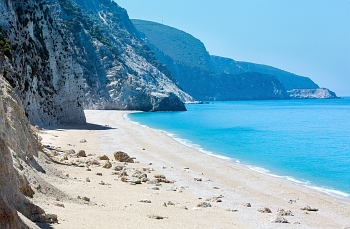 is the euro. Greece is also a member of the Schengen Agreement, which according to the Visa policy of the Schengen Area gives the privilege to any visitors from countries that have signed and implemented this treaty to travel only with their passport or national identity card, without the need for a visa. That puts Greece in the top 20 easiest countries to visit worldwide. Its Geography can appeal to all tastes, as mainland Greece consists of both steep mountains and large plains, while it is also surrounded by seas that are home to numerous islands of different climates and environments.
is the euro. Greece is also a member of the Schengen Agreement, which according to the Visa policy of the Schengen Area gives the privilege to any visitors from countries that have signed and implemented this treaty to travel only with their passport or national identity card, without the need for a visa. That puts Greece in the top 20 easiest countries to visit worldwide. Its Geography can appeal to all tastes, as mainland Greece consists of both steep mountains and large plains, while it is also surrounded by seas that are home to numerous islands of different climates and environments.
The country's official name is 'Hellenic Republic' and the official language is Greek, spoken by 99% of the population. Greek has one of the longest documented histories of any language and Greek literature has a continuous history of over 2,500 years. This renders Greek the 6th oldest language still in use today. Several notable literary works, including the Homeric epics, Euclid's Elements and the New Testament, were originally written in Greek. Alas, the language barrier is never a problem for visitors. All schoolchildren start learning English from a very young age, with most Greeks, especially under the age of 40, being fluent in English. The country's economy is largely based on the tourism industry, so most professionals, especially in the more popular tourist destinations, usually have a good command of English as well as a few other languages. Other widely used foreign languages that are frequently learned by Greeks are French, German, Spanish and Italian. So, you don't really need to speak any Greek, except perhaps to impress your friends!
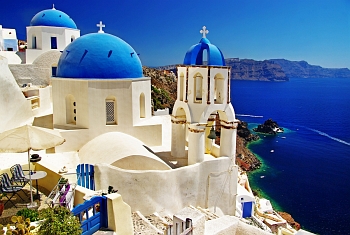 The official religion in Greece is Christianity and most Greeks are Christians, belonging to the Greek Orthodox Church, with minorities of other religions also present in the country. However, Greeks' progressive attitude means that you will always be made to feel welcomed irregardless of your faith, or lack thereof. Onto some more technical basic information; electricity in Greece is at 220 V/50 Hz and plugs are the standard continental (DIN) type with two round pins. ATMs are widely available all over the country, with banks open from Monday to Thursday, 8:00-14:30 hrs and on Friday, 8:00-14:00 hrs; on Saturdays and Sundays they are closed. Central branches of some banks may be found open until 20.00 daily and from 10.00 to 16.30 on Saturdays. For further details while in Greece please consult your hotel concierge.
The official religion in Greece is Christianity and most Greeks are Christians, belonging to the Greek Orthodox Church, with minorities of other religions also present in the country. However, Greeks' progressive attitude means that you will always be made to feel welcomed irregardless of your faith, or lack thereof. Onto some more technical basic information; electricity in Greece is at 220 V/50 Hz and plugs are the standard continental (DIN) type with two round pins. ATMs are widely available all over the country, with banks open from Monday to Thursday, 8:00-14:30 hrs and on Friday, 8:00-14:00 hrs; on Saturdays and Sundays they are closed. Central branches of some banks may be found open until 20.00 daily and from 10.00 to 16.30 on Saturdays. For further details while in Greece please consult your hotel concierge.
People and gestures
 The Greek people are friendly, social, hard-working but also revelers, encompassing all the great qualities of the Mediterranean civilizations. Greek hospitality is a concept that dates back to ancient times, with the worship of god Zeus Xenios, the protector of travelers, thus even today, in Greece everyone is treated like family. Greeks gesture a lot using their hands and are more than willing to give you advice, instructions or answer any question you might have. Coffee culture is big in the country, with locals gathering almost daily for a chat over coffee. In Greece, it is quite common for people to go out for coffee after dinner and stay out for an hour or two just chatting and enjoying each other's company. Coffee shops in Greece are essentially places for the exchange of ideas, debate over the latest political developments, or simply relaxing. Another characteristic of the people of Greece is their willingness to share everything and treat foreigners to local delicacies.
The Greek people are friendly, social, hard-working but also revelers, encompassing all the great qualities of the Mediterranean civilizations. Greek hospitality is a concept that dates back to ancient times, with the worship of god Zeus Xenios, the protector of travelers, thus even today, in Greece everyone is treated like family. Greeks gesture a lot using their hands and are more than willing to give you advice, instructions or answer any question you might have. Coffee culture is big in the country, with locals gathering almost daily for a chat over coffee. In Greece, it is quite common for people to go out for coffee after dinner and stay out for an hour or two just chatting and enjoying each other's company. Coffee shops in Greece are essentially places for the exchange of ideas, debate over the latest political developments, or simply relaxing. Another characteristic of the people of Greece is their willingness to share everything and treat foreigners to local delicacies.
Greeks are open and casual people and use an impressive amount of body language and gestures in order to express their feelings. When a person is introduced to another for the first time, a handshake is a common and appropriate gesture. But when greeting someone you already know, an old friend or neighbor, the gestures differ according to gender and level of intimacy. Between men a strong handshake or hug is considered normal and a sign of friendship. Between women or between a man and a woman, a hug and two simultaneous kisses, one on each cheek, always come naturally. This may alienate you the first time you encounter it, but the openness of Greeks should not make anyone feel uncomfortable, as they perceive this behavior as a common way of expressing gratitude and sympathy, a custom passed on from one generation to the next. Also, nodding up and down your head is an affirmative gesture of agreement and nodding your head right and left (within a normal range of 30 degrees to each direction) is a negative gesture for disagreement. That can be confusing to someone unfamiliar with the intricacies of Greek customs, as at times they may seem to imitate a bobble-head, but there is meaning behind these movements. One thing you should definitely keep in mind is to avoid stretching your hand or hands towards someone with your palms open and all five fingers extended out, like signaling someone to stop. In Greek this is called 'mountza' and it is a form of 'swearing' or insulting someone.
Geography
Wherever you find yourself in Greece, you will always be relatively close to the sea. When you are at sea, you can't sail for long without encountering one of the many well-known Greek islands, or the country's diverse shoreline. When it comes to it, it's not easy to take your pick out of the 6000 options you have when it comes to Greek islands and islets, 227 of them being inhabited. Their rocky coast lines, sandy beaches, charming villages, whitewashed Cycladic houses, breath-taking sunsets, inviting scents of sea and traditional food, calming sound of the waves, crystal clear or turquoise waters, sheltered bays and yacht harbors make each and every one of them unique and justifiably popular among all kinds of travelers.
Although small, Greece has the longest coastline on the Mediterranean Basin and the 11th longest in the world at 13,676 km 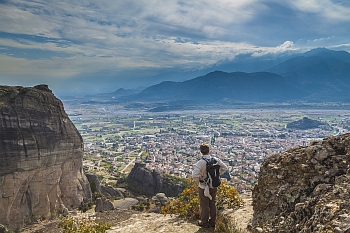 (8,498 mi) in length, featuring a vast number of islands. Excellent seawater quality, litter management, environmental protection and organized swimming areas give Greece the honor of being one of the countries whose exquisite beaches and marinas, receive that many Blue Flags worldwide.
(8,498 mi) in length, featuring a vast number of islands. Excellent seawater quality, litter management, environmental protection and organized swimming areas give Greece the honor of being one of the countries whose exquisite beaches and marinas, receive that many Blue Flags worldwide.
On the other hand, the mainland has nothing to envy, being ornate with sublime mountain ranges, vast wine-producing valleys, incredible waterfalls, beautiful rivers, peaceful lakes, thermal spring (many of which are classified as therapeutic by the National Institute for Geographical and Mineral Research), vast stretches of olive groves producing the famous Greek olive oil and lush forests, hosting a great variety of flora and fauna.
Climate
 Weather conditions in Greece are quite varied, with the country enjoying a so-called Mediterranean climate. In most of the country and especially the coastal areas, the climate is almost identical to much of California. Summers are relatively hot and dry, but cooled by seasonal winds, with a 7-month period of near-constant sunshine from April to November. That has earned Greece the title of the 'Sunniest' country in Europe, with 250 sunny days per year on average. The most pleasant weather occurs in May-June and September-October. Winters are mild especially at low altitude, yet mountains are usually snow-covered.
Weather conditions in Greece are quite varied, with the country enjoying a so-called Mediterranean climate. In most of the country and especially the coastal areas, the climate is almost identical to much of California. Summers are relatively hot and dry, but cooled by seasonal winds, with a 7-month period of near-constant sunshine from April to November. That has earned Greece the title of the 'Sunniest' country in Europe, with 250 sunny days per year on average. The most pleasant weather occurs in May-June and September-October. Winters are mild especially at low altitude, yet mountains are usually snow-covered.
The vast majority of visitors arrive during the height of the tourist season, which is April through October. Peak season is July through August and it is characterized by crowded islands and beaches, higher prices and low accommodation availability. During that period, temperatures usually reach 30°C to 35°C, although there are still many rewarding areas in the country, free of large-scale tourism. If you want to enjoy the sun and sea of the Greek islands, the best months are May - being quite inexpensive and free of swarming crowds, June - combining warm summer temperatures and still affordable, and mid-September through October, which is ideal for budget-minded travelers while the weather holds up well. The capital, Athens and the mainland are all year round destinations. For visitors from northern climates, the off-season (November through February) can be a rewarding time to explore Greece. It won't be beach weather, but temperatures are very mild compared to winters worldwide.
accommodation availability. During that period, temperatures usually reach 30°C to 35°C, although there are still many rewarding areas in the country, free of large-scale tourism. If you want to enjoy the sun and sea of the Greek islands, the best months are May - being quite inexpensive and free of swarming crowds, June - combining warm summer temperatures and still affordable, and mid-September through October, which is ideal for budget-minded travelers while the weather holds up well. The capital, Athens and the mainland are all year round destinations. For visitors from northern climates, the off-season (November through February) can be a rewarding time to explore Greece. It won't be beach weather, but temperatures are very mild compared to winters worldwide.
Facilities
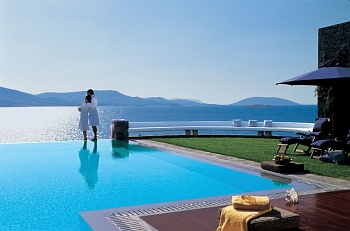 As a developed country and simultaneously one highly dependent on tourism, Greece offers a wide variety of tourist facilities. The tourism infrastructure in Greece has been greatly improved since the 2004 Athens Olympic Games and continues to expand with a number of important projects. There is a wide variety of accommodation available, from family-owned guesthouses and small hotels, to luxurious villas. Conference tourism, targeted at academic, business and cultural markets is a cornerstone of the Greek national tourism policy, with the Greek government offering lucrative cash grants for new conference facilities and the expansion of existing ones.
As a developed country and simultaneously one highly dependent on tourism, Greece offers a wide variety of tourist facilities. The tourism infrastructure in Greece has been greatly improved since the 2004 Athens Olympic Games and continues to expand with a number of important projects. There is a wide variety of accommodation available, from family-owned guesthouses and small hotels, to luxurious villas. Conference tourism, targeted at academic, business and cultural markets is a cornerstone of the Greek national tourism policy, with the Greek government offering lucrative cash grants for new conference facilities and the expansion of existing ones.
Greece is also a famous venue for weddings, offering amazing facilities in diverse landscapes and settings, sprinkled with beautiful wedding customs like folk dances and music, as well as other unique traditions. Visitors can choose between exotic islands with stunning sunsets or lush green mountains populated with cozy stone houses. 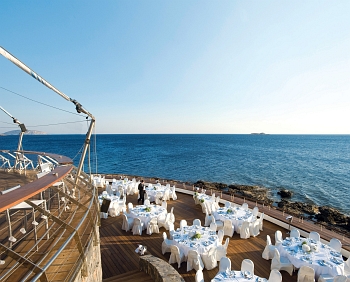 From traditional, picturesque houses to luxury villas and from a Santorini black-sand beach-wedding to the luxurious estates of Athens or Mykonos, there is room for every taste. Honeymooners can spend their days in the relaxing setting of their dreams or in some of the most cosmopolitan places, characterized by vivid nightlife and a wide variety of entertainment options. Greece can offer the perfect mix for a romantic, unspoiled, once-in-a-lifetime wedding ceremony.
From traditional, picturesque houses to luxury villas and from a Santorini black-sand beach-wedding to the luxurious estates of Athens or Mykonos, there is room for every taste. Honeymooners can spend their days in the relaxing setting of their dreams or in some of the most cosmopolitan places, characterized by vivid nightlife and a wide variety of entertainment options. Greece can offer the perfect mix for a romantic, unspoiled, once-in-a-lifetime wedding ceremony.
Concerning the health system, Greece, home of Hippocrates and Asclepius, has adequate medical facilities with some, particularly private clinics and hospitals in Athens and Thessaloniki, being of the highest caliber. Greece also has plenty of pharmacies to cover any emergency, some of which are always designated to stay open all night. However, visitors are advised to think ahead and carry with them any specific medicine they require, to avoid any unpleasant situation, or the hassle of hunting down a specific brand of medication. Greek Tourist Police offices are located throughout Greece wherever there are enough travelers to warrant their presence and their staff receive special training in dealing with visitors.
 Transport in Greece has counted significant additions during the past two decades, vastly modernizing and enhancing the country's infrastructure. The country has more than enough ports, harbors and airports to accommodate its needs. Ferries remain the predominant way of transport between the nation's islands, but airports in some of the most prominent islands can save travelers valuable time. Greece's public transportation is equally developed, including railways, metro routes, commuter rail, tram, urban bus transports, intercity and regional buses (KTEL). The Athens International Airport is a prime example of the improvement of the integrated transport improvement, being an international hub connecting three continents due to its geographical location. It is constantly on the top 30 busiest European airports, averaging around 24 million passengers per year.
Transport in Greece has counted significant additions during the past two decades, vastly modernizing and enhancing the country's infrastructure. The country has more than enough ports, harbors and airports to accommodate its needs. Ferries remain the predominant way of transport between the nation's islands, but airports in some of the most prominent islands can save travelers valuable time. Greece's public transportation is equally developed, including railways, metro routes, commuter rail, tram, urban bus transports, intercity and regional buses (KTEL). The Athens International Airport is a prime example of the improvement of the integrated transport improvement, being an international hub connecting three continents due to its geographical location. It is constantly on the top 30 busiest European airports, averaging around 24 million passengers per year.
Internet availability
 Modern digital information and communication networks reach all areas of Greece. There are over 35,000 km (21,748 mi) of fiber optics and an extensive open-wire network. ADSL2+ is currently the main broadband standard. Greece also has 4G mobile broadband and a more expensive Satellite Internet access. Internet access is widely available. Coffee houses and some public spaces usually provide wireless internet connection, as long as you ask the staff for the password. We would be remiss not to mention that our VIP Mercedes, ideal for big families, inseparable parties and special custom tours, is equipped with free Wireless Internet Access so that you can stay connected on route from the moment that you arrive in Greek soil.
Modern digital information and communication networks reach all areas of Greece. There are over 35,000 km (21,748 mi) of fiber optics and an extensive open-wire network. ADSL2+ is currently the main broadband standard. Greece also has 4G mobile broadband and a more expensive Satellite Internet access. Internet access is widely available. Coffee houses and some public spaces usually provide wireless internet connection, as long as you ask the staff for the password. We would be remiss not to mention that our VIP Mercedes, ideal for big families, inseparable parties and special custom tours, is equipped with free Wireless Internet Access so that you can stay connected on route from the moment that you arrive in Greek soil.
Water
 Tap water is drinkable everywhere in the country, especially in the mainland, as it goes through purification procedures and controls. Taste varies from place to place. Kitchen taps offer drinkable water almost everywhere but you should avoid drinking from a bathroom tap when staying at a hotel because the water might come from a tank.
Tap water is drinkable everywhere in the country, especially in the mainland, as it goes through purification procedures and controls. Taste varies from place to place. Kitchen taps offer drinkable water almost everywhere but you should avoid drinking from a bathroom tap when staying at a hotel because the water might come from a tank.
Concerning the islands, first timers should pay some additional attention. Due to the warm Mediterranean climate and the lack of natural water resources, some of the islands end up desalinating sea water or using water from drills. Sometimes they also transfer water from the mainland in order to cover their everyday needs. This water is more suitable for taking a shower or brushing your teeth and less suitable for drinking. This of course does not mean that the water is poisonous or infected, but it is a fact that the human body reacts to every change concerning water consumption.
Thus, on islands as well as some remote villages in the mainland, it is preferable to drink bottled water, which can be found anywhere and on a very low price compared to other countries. The price of bottled water when bought at kiosks is regulated. All around the country a small bottle of 50 ml costs 50 cents while a large bottle of 1 liter costs 1 euro. Bottled water costs even less when purchased in super-markets but you might encounter higher prices in restaurants. It is also worth noting that in coffee places, the staff will use bring you tap water for free, without even asking for it. The rule of thumb is to observe how the local people act and drink accordingly. You can drink as much ouzo as you can handle but in regards to tap water the golden rule is 'when in Rome do as the Romans do'.
Multi-level safety
Don't let any unreasonable fears daunt you. Keep in mind the quote from Aldous Huxley; 'To travel is to discover that everyone is wrong about other countries'. Athens is one of the safest world capitals, with very low violent crime and theft rates. Public disorder is rare and public drunkenness is generally frowned upon. Visitors should rest assured that this is a safe and friendly destination, but it is always advisable for tourists to exercise basic precautionary measures just as they would do at home. You should also keep an eye for pickpockets, who in particular seem to remain active at popular tourist sites and on public transportation systems. The Metro railway system provides its own guards that move around the trains insuring the safe movement of citizens. Take full advantage of the guidance that our qualified travel agents will be more than delighted to offer you concerning some areas that are supposed to be more dangerous during certain times of the day, usually late at night.
History
Greece boasts a very long history, with the Greek language being spoken in the country in some form or another for nearly 4000 years. All three stages of the Stone Age (Paleolithic, Mesolithic, and Neolithic) are represented in Greece, a country that is home to the first advanced civilizations in Europe. The country's first inhabitants are now referred to as the Pelasgians. Little is known about them, but it is believed that they were a primitive people. The first advanced civilizations in Greece are known as the Cycladic in the Cyclades Islands, and the Minoan in Crete and Santorini. During the Bronze Age, Greek-speaking Indo-European people arrived in the country from somewhere to the north around 1700 BC, and slowly invaded the entire country from the north all the way to Crete, as well as the west coast of Asia Minor (now Turkey), absorbing the native population. Their arrival may have been responsible for ending the Cycladic and Minoan civilizations and brought the country into what is now referred to as the Dark Age of ancient Greece; although it is now understood among historians that civilization in Greece remained sophisticated and advanced during this time.The first Greek-speaking civilization, the Mycenaean civilization, centered in the Peloponnese region and was prominent during this time period. Many ancient Greeks made a living from the sea, as their descendants the modern Greeks do now. They became accomplished fishermen, seamen and traders and the sea has profoundly shaped the Greek civilization ever since.
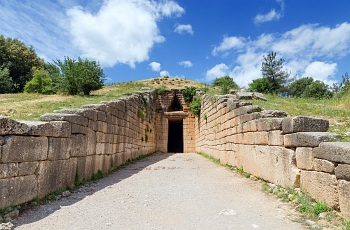 Next came the Golden Age of Greece, which lasted many centuries and spurred several scientific, architectural, political, economic, artistic, and literary achievements. During this period, Greece was separated into smaller districts, they so-called city-states that occurred from 1200 to 800 BC. Athens, Sparta, Corinth, and Thebes were the most prominent ones, with Athens being the most prestigious. Greek settlements were also established in southern Italy and other coastal areas of the Mediterranean, which was colonized by Greeks. The legacy of the Greek civilization of that era had a major impact on the world and continues to influence Western civilizations to this day.
Next came the Golden Age of Greece, which lasted many centuries and spurred several scientific, architectural, political, economic, artistic, and literary achievements. During this period, Greece was separated into smaller districts, they so-called city-states that occurred from 1200 to 800 BC. Athens, Sparta, Corinth, and Thebes were the most prominent ones, with Athens being the most prestigious. Greek settlements were also established in southern Italy and other coastal areas of the Mediterranean, which was colonized by Greeks. The legacy of the Greek civilization of that era had a major impact on the world and continues to influence Western civilizations to this day.
During the Hellenistic and Roman eras, the epicenter of Greek Civilization shifted from southern to northern Greece. The Macedonian kingdom, under Alexander the Great, conquered all of Greece, and proceeded eastward, creating an empire all the way to South Asia with the stated intent of spreading the Greek civilization to the far ends of the Earth. The empire broke down after Alexander's death, and Greece was eventually annexed by the growing Roman Empire. Although weakened politically, Greeks continued to flourish under Roman rule and heavily influenced Roman culture.
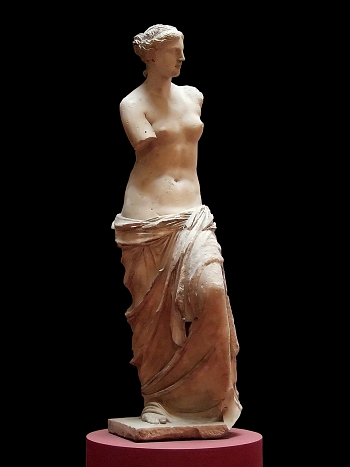 Christianity arrived in Greece with the preachings of St. Paul during the 1st century AD and eventually spread throughout Greece and the Roman Empire. In the 4th century, Roman Emperor Constantine the Great legalized Christian worship and declared it the state religion of the empire. He moved the capital of the empire from Rome to Byzantium (present day Istanbul), which he renamed Constantinople. Internal divisions eventually divided the Roman Empire into a western half (the West Roman Empire) and an eastern half (East Roman Empire). The Western half was eventually invaded and sacked by invaders from northern Europe, while the East survived for another millennium as the Byzantine Empire with Constantinople as its capital. Greece's medieval history is dominated by the Byzantine Empire, a powerful force in the Mediterranean basin for centuries, engaging in trade, politics and the spread of Christianity. The empire collaborated with Rome during the Crusades against the Muslims. However, during the 13th century, the Crusaders turned on the Byzantine Empire itself and sacked Constantinople. With a weakened Byzantine Empire, Frankish and Latin invaders arrived and occupied various parts of Greece. Over the following centuries, the Byzantine Empire began to regain strength and reconquering lost territory, but received a final blow in the 15th century when a growing Ottoman Turkish Empire to the east conquered Constantinople. With the capture of Constantinople, Greece fell under Ottoman Turkish rule, but vigorously retained its Greek-speaking Christian culture. However, many Greeks fled the country, establishing communities elsewhere in Europe; these communities would later influence the Greek Revolution.
Christianity arrived in Greece with the preachings of St. Paul during the 1st century AD and eventually spread throughout Greece and the Roman Empire. In the 4th century, Roman Emperor Constantine the Great legalized Christian worship and declared it the state religion of the empire. He moved the capital of the empire from Rome to Byzantium (present day Istanbul), which he renamed Constantinople. Internal divisions eventually divided the Roman Empire into a western half (the West Roman Empire) and an eastern half (East Roman Empire). The Western half was eventually invaded and sacked by invaders from northern Europe, while the East survived for another millennium as the Byzantine Empire with Constantinople as its capital. Greece's medieval history is dominated by the Byzantine Empire, a powerful force in the Mediterranean basin for centuries, engaging in trade, politics and the spread of Christianity. The empire collaborated with Rome during the Crusades against the Muslims. However, during the 13th century, the Crusaders turned on the Byzantine Empire itself and sacked Constantinople. With a weakened Byzantine Empire, Frankish and Latin invaders arrived and occupied various parts of Greece. Over the following centuries, the Byzantine Empire began to regain strength and reconquering lost territory, but received a final blow in the 15th century when a growing Ottoman Turkish Empire to the east conquered Constantinople. With the capture of Constantinople, Greece fell under Ottoman Turkish rule, but vigorously retained its Greek-speaking Christian culture. However, many Greeks fled the country, establishing communities elsewhere in Europe; these communities would later influence the Greek Revolution.
The Italian city-states of Genoa and Venice competed with the Ottoman Turks for control of various areas of Greece and managed to conquer certain islands and coastal areas, bringing pan-European movements such as the Renaissance to places in Greece such as Crete, Corfu and parts of the Peloponnese region. In the 18th century, the Enlightenment, both in Venetian/Genoese-occupied areas of Greece and in Greek communities abroad, led to an awakening among prominent Greeks and gave birth to the goal of an independent Greek state. The Greek Revolution finally broke out on the 25th of March 1821 and led to a long war against the Ottomans for independence. The Greek Revolution gained attention across Europe with Russia, Britain, and France sending military aid to assist Greece.
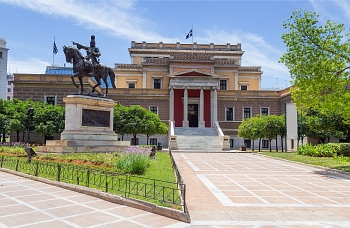 The nation finally achieved its independence from the Ottoman Empire in 1829. The newly-independent Greek State was briefly a republic, before becoming a monarchy at the will of major European powers. During the second half of the 19th century and the first half of the 20th century, Greece gradually annexed neighboring islands and territories with Greek-speaking populations. The country sided with the allies during WWI and despite initially declaring neutrality it was invaded by Mussolini's military in 1941. Greek forces victoriously pushed the Italians out of Greece, but the Germans then came to their aid, occupying the country until its liberation toward the end of the war. Civil war broke out in 1946 between communist rebels and royalists, the former supported by Yugoslavia (until the Tito-Stalin rift of 1948) and the latter by the West. The communist rebels were defeated by the royalists in 1949. World War II and the civil war that followed had left the country in a war-torn state, forcing many people to flee Greece in search of a better life abroad.
The nation finally achieved its independence from the Ottoman Empire in 1829. The newly-independent Greek State was briefly a republic, before becoming a monarchy at the will of major European powers. During the second half of the 19th century and the first half of the 20th century, Greece gradually annexed neighboring islands and territories with Greek-speaking populations. The country sided with the allies during WWI and despite initially declaring neutrality it was invaded by Mussolini's military in 1941. Greek forces victoriously pushed the Italians out of Greece, but the Germans then came to their aid, occupying the country until its liberation toward the end of the war. Civil war broke out in 1946 between communist rebels and royalists, the former supported by Yugoslavia (until the Tito-Stalin rift of 1948) and the latter by the West. The communist rebels were defeated by the royalists in 1949. World War II and the civil war that followed had left the country in a war-torn state, forcing many people to flee Greece in search of a better life abroad.
Greece joined NATO in 1952 with rapid economic growth and social change following. A right-wing military dictatorship staged a coup in 1967, disbanding all political parties, suspending political liberties and forcing many prominent Greeks into exile, including Communists, who played an active part in the Greek Parliament before and after the junta. King Constantine II and his family also fled the country. Democracy returned in 1974, and a national referendum abolished the monarchy, creating a parliamentary republic. In the recent past, Greece joined the European Community or EC in 1981, which later became the European Union (EU) in 1992. The country's tourism industry – which had begun to take off during the 1960's – began to flourish, bringing 5 million annual visitors to the country in 1980 (a figure that will eventually grow to over 24 million by 2018). In 2004, the nation stepped into the global spotlight once again, as it successfully hosted the Summer Olympic Games in Athens.
Cultural Heritage
Greeks satirize the abundance of ancient Greek ruins by suggesting not to dig too deep or you might unveil a lost monument and find your house taken over by a museum. A typical example of this is the subway work that unearthed many ancient ruins including a 2,000-year-old road in Greece, apparently delaying the completion of the works. Many of the ruins are being displayed and protected behind glass partition at some of the metro railway stations, such as the central station of Syntagma. Greece has an ancient culture that has had significant influence on the arts, language, philosophy, politics, and sports of the western world, including the genres of comedy and drama, western alphabets, Platonic ideals and the Socratic Method, the notion of democracy and the Olympic Games. The culture of Greece has evolved over thousands of years, beginning in Mycenaean Greece and continuing most notably into Classical Greece, through the influence of the Roman Empire and its Greek Eastern continuation, the Byzantine Empire. Other cultures and nations, such as the Latin and Frankish states, the Ottoman Empire, the Venetian Republic, the Genoese Republic and the British Empire have also left their mark on modern Greek culture, although historians credit the Greek War of Independence with revitalizing Greece and giving birth to a single, cohesive entity of its multi-faceted culture.
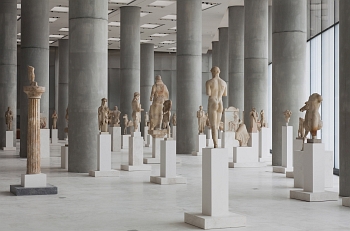 Several kinds of museums are located throughout Greece. Most of them can be found in the big cities like Athens, where the famous New Acropolis Museum and the National Archaeological Museum are located. Furthermore there is a vast number of galleries like the National Gallery in Athens. There are many museums in Thessaloniki as well, with perhaps the most important being the city's Byzantine Museum. Overall, there are approximately 150 museums all over the country which are easily accessible for tourists. Even the smallest island in the country typical have an archaeological or folk art museum to exhibit findings from ancient civilizations that inhabited the area. Our experienced travel agents can always assist with cultural activities that best suit your requirements so be sure to ask us about available activities in the places you intend to visit during your stay in Greece.
Several kinds of museums are located throughout Greece. Most of them can be found in the big cities like Athens, where the famous New Acropolis Museum and the National Archaeological Museum are located. Furthermore there is a vast number of galleries like the National Gallery in Athens. There are many museums in Thessaloniki as well, with perhaps the most important being the city's Byzantine Museum. Overall, there are approximately 150 museums all over the country which are easily accessible for tourists. Even the smallest island in the country typical have an archaeological or folk art museum to exhibit findings from ancient civilizations that inhabited the area. Our experienced travel agents can always assist with cultural activities that best suit your requirements so be sure to ask us about available activities in the places you intend to visit during your stay in Greece.
World famous Greek monuments include the iconic Parthenon in the bustling capital Athens, which is not only a trademark of the city but a universal sign for democracy and the splendid site of Delphi, 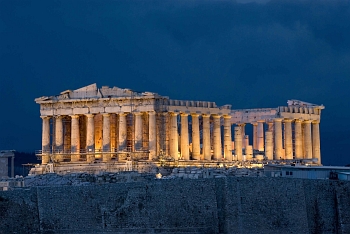 where even kings sought advice in the prophecies of the most prominent oracle in the ancient Greek world. There's the temple of Apollo at Bassae and the gorgeous old city of Rhodes, once overlooked by the Colossus of Rhodes, one of the seven wonders of the world. The archaeological site of Olympia was the birthplace of our modern Olympic Games and the place from where the Olympic flame is sent across the world every four years. The many Byzantine monasteries of Meteora are just stunning to look at, built high on natural sandstone rock pillars. At the small town of Vergina the ancient site of Agai was discovered and many valuable artifacts were dug up in several untouched tombs, one of them being the tomb of Philip II of Macedon, father of Alexander the Great. Northern Greece is full of ancient monuments that don't always receive the attention they deserve, so a comprehensive tour of the area can be a highly rewarding experience.
where even kings sought advice in the prophecies of the most prominent oracle in the ancient Greek world. There's the temple of Apollo at Bassae and the gorgeous old city of Rhodes, once overlooked by the Colossus of Rhodes, one of the seven wonders of the world. The archaeological site of Olympia was the birthplace of our modern Olympic Games and the place from where the Olympic flame is sent across the world every four years. The many Byzantine monasteries of Meteora are just stunning to look at, built high on natural sandstone rock pillars. At the small town of Vergina the ancient site of Agai was discovered and many valuable artifacts were dug up in several untouched tombs, one of them being the tomb of Philip II of Macedon, father of Alexander the Great. Northern Greece is full of ancient monuments that don't always receive the attention they deserve, so a comprehensive tour of the area can be a highly rewarding experience.
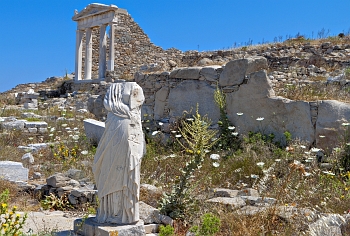 Proudly situated on Mt. Taygetos is the ancient town of Mystras, close to (and often mistaken for) ancient Sparta. Another unique site is the archaeological , not far from the popular holiday destination Mykonos. According to myth, this was were Apollo and Artemis were born. The island used to be the main Panhellenic sanctuary and is now dotted with archaeological remains.
Proudly situated on Mt. Taygetos is the ancient town of Mystras, close to (and often mistaken for) ancient Sparta. Another unique site is the archaeological , not far from the popular holiday destination Mykonos. According to myth, this was were Apollo and Artemis were born. The island used to be the main Panhellenic sanctuary and is now dotted with archaeological remains.
Some major sights are conveniently located on beautiful Greek islands, allowing for a delightful combination of sightseeing and relaxing on one of the many fine beaches. Patmos is a lovely example, boasting the historic center Chora, the Monastery of Saint John the Theologian and the Cave of the Apocalypse, but also some pleasant sea side restaurants with pretty views. Corfu has the same characteristics, being a popular holiday destination with good beaches and an impressive historic town center. Although not an island, the ancient Mount Athos is located in the north of Greece, on the peninsula of Chalkidiki. It's one of the country's most popular tourist regions with excellent beaches, numerous other ancient sites and many charming villages.
Art
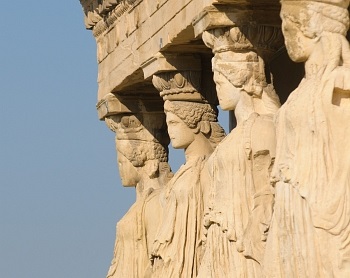 Greek art (or, more correctly, art in Greece) began in the Cycladic and Minoan civilizations and gave birth to Western classical art in the subsequent Geometric, Archaic and Classical periods (with further developments during the Hellenistic Period). It absorbed influences of Eastern civilizations, Roman art and its patrons, as well as the new religion of Orthodox Christianity in the Byzantine era. Additionally, influenced by Italian and European ideas during the period of Romanticism (with the invigoration of the Greek Revolution), right up until the Modernist and Postmodernist. Art in ancient Greece came mainly in fundamental five forms: architecture, sculpture, painting, pottery and jewelry making. All museums feature exhibits from that era, but the are is also a number of folk art museums that have shown the artistic evolution that took place in Greece over the centuries.
Greek art (or, more correctly, art in Greece) began in the Cycladic and Minoan civilizations and gave birth to Western classical art in the subsequent Geometric, Archaic and Classical periods (with further developments during the Hellenistic Period). It absorbed influences of Eastern civilizations, Roman art and its patrons, as well as the new religion of Orthodox Christianity in the Byzantine era. Additionally, influenced by Italian and European ideas during the period of Romanticism (with the invigoration of the Greek Revolution), right up until the Modernist and Postmodernist. Art in ancient Greece came mainly in fundamental five forms: architecture, sculpture, painting, pottery and jewelry making. All museums feature exhibits from that era, but the are is also a number of folk art museums that have shown the artistic evolution that took place in Greece over the centuries.
Architecture
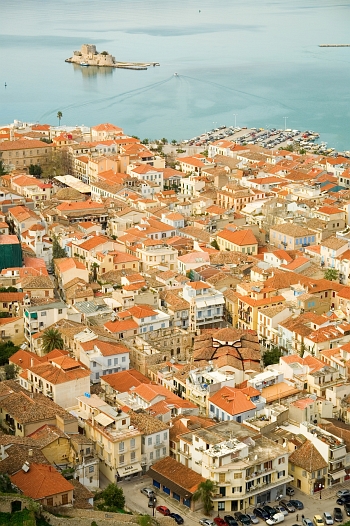 Many first-time visitors arrive in Greece with specific images in mind and are surprised to discover a country with such regional and architectural diversity. The famous white-washed houses and charming blue-domed churches only characterize a specific region of the country, namely the Cycladic islands. Architecture varies greatly from one region to the next depending on local history. Visitors will find Neoclassical architecture in the cities of Ermoupolis and Nafplion, Ottoman-influenced buildings in Grevená and Kozáni, white-washed stone houses built on the Cycladic style on the island of Paros and pastel-colored baroque buildings and churches on Corfu. Greece's historical sights are just as varied; the country is home to just as many medieval churches and castles, as classical ruins and temples. Ancient Greek architecture is best known for its temples, many of which are found throughout the region, mostly as ruins, although many remain substantially intact. The second most important type of building that survives throughout the Hellenic world is the open-air theatre, with the earliest dating around 350 BC. The main concept behind classical Greek architecture is architectural beauty based on balance and proportion (such as the Golden Ratio).
Many first-time visitors arrive in Greece with specific images in mind and are surprised to discover a country with such regional and architectural diversity. The famous white-washed houses and charming blue-domed churches only characterize a specific region of the country, namely the Cycladic islands. Architecture varies greatly from one region to the next depending on local history. Visitors will find Neoclassical architecture in the cities of Ermoupolis and Nafplion, Ottoman-influenced buildings in Grevená and Kozáni, white-washed stone houses built on the Cycladic style on the island of Paros and pastel-colored baroque buildings and churches on Corfu. Greece's historical sights are just as varied; the country is home to just as many medieval churches and castles, as classical ruins and temples. Ancient Greek architecture is best known for its temples, many of which are found throughout the region, mostly as ruins, although many remain substantially intact. The second most important type of building that survives throughout the Hellenic world is the open-air theatre, with the earliest dating around 350 BC. The main concept behind classical Greek architecture is architectural beauty based on balance and proportion (such as the Golden Ratio).
Music
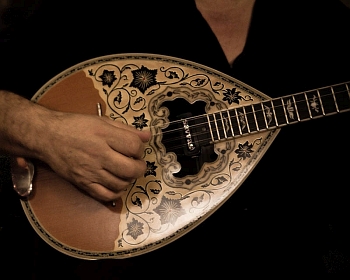 Greek music is as diverse and celebrated as the country's history. It is separated into two major waves: Greek traditional music and Byzantine music, which is influenced by oriental sounds. These compositions have existed for millennia: they originated in the Byzantine period and Greek antiquity; there is a continuous development which appears in language, rhythm, structure and melody. Music is a significant aspect of Hellenic culture, both within Greece and the diaspora. Depending on where you find yourself, you will also encounter different types of folk dancing, most of which are conducted within a group to enhance social ties. The Cycladic islands and the mountainous regions of Greece have vastly different dances, which vary heavily both in choreography and rhythm. If you are a first time visitor, it would be a unique experience to find yourself in a festival or social gathering like that.
Greek music is as diverse and celebrated as the country's history. It is separated into two major waves: Greek traditional music and Byzantine music, which is influenced by oriental sounds. These compositions have existed for millennia: they originated in the Byzantine period and Greek antiquity; there is a continuous development which appears in language, rhythm, structure and melody. Music is a significant aspect of Hellenic culture, both within Greece and the diaspora. Depending on where you find yourself, you will also encounter different types of folk dancing, most of which are conducted within a group to enhance social ties. The Cycladic islands and the mountainous regions of Greece have vastly different dances, which vary heavily both in choreography and rhythm. If you are a first time visitor, it would be a unique experience to find yourself in a festival or social gathering like that.
Religion
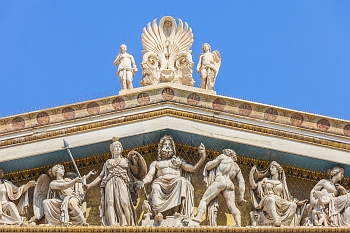 In antiquity, the 12 Olympian Gods, also known as the Dodekatheon were the principal deities of the Greek pantheon. Residing atop of Mount Olympus, these deities exhibited a fantastic range of human behavior and presided over very specific aspects of everyday life. The Olympians gained their supremacy in a war of gods in which Zeus led his siblings to victory over the Titans. In addition to the twelve main gods and the innumerable lesser deities, ancient Greeks worshiped a deity they called "Agnostos Theos", which in translates to "Unknown God". In Athens, there was a temple specifically dedicated to that god and very often Athenians would swear "in the name of the Unknown God". Greece is full of remnants of ancient temples dedicated to the ancient Greek gods, with the best-preserved one being the Temple of Hephaestus in Athens.
In antiquity, the 12 Olympian Gods, also known as the Dodekatheon were the principal deities of the Greek pantheon. Residing atop of Mount Olympus, these deities exhibited a fantastic range of human behavior and presided over very specific aspects of everyday life. The Olympians gained their supremacy in a war of gods in which Zeus led his siblings to victory over the Titans. In addition to the twelve main gods and the innumerable lesser deities, ancient Greeks worshiped a deity they called "Agnostos Theos", which in translates to "Unknown God". In Athens, there was a temple specifically dedicated to that god and very often Athenians would swear "in the name of the Unknown God". Greece is full of remnants of ancient temples dedicated to the ancient Greek gods, with the best-preserved one being the Temple of Hephaestus in Athens.
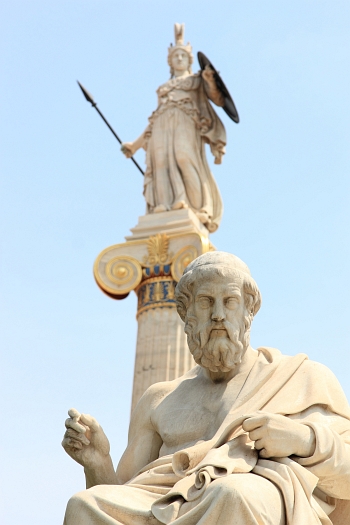 Additionally, classical Athens may be suggested to have heralded some of the same religious ideas that would later be promoted by Christianity, such as Aristotle's invocation of a perfect God, and Heraclitus' Logos. Plato considered there were rewards for the virtuous in the heavens and punishment for the wicked under the earth; the soul was valued more highly than the material body, and the material world was understood to be imperfect and not fully real (illustrated in Socrates's allegory of the cave).
Additionally, classical Athens may be suggested to have heralded some of the same religious ideas that would later be promoted by Christianity, such as Aristotle's invocation of a perfect God, and Heraclitus' Logos. Plato considered there were rewards for the virtuous in the heavens and punishment for the wicked under the earth; the soul was valued more highly than the material body, and the material world was understood to be imperfect and not fully real (illustrated in Socrates's allegory of the cave).
Most Greeks nowadays belong to the Greek Orthodox Church, which is governed by a synod of metropolitan bishops, presided over by the Archbishop of Athens. The largest religious minority is the concentration of Greek Muslims in northeastern Thrace. Some islands in the Ionian and Aegean have a significant number of Catholics. Greece's once vibrant Jewish community was nearly vanished in World War II. Greeks and foreign visitors are stunned by Greece’s majestic churches of the Byzantine era, countless rural churches and metochia (monastery grounds and gardens), sacred places of pilgrimage and religious sites, all of which inspire awe. 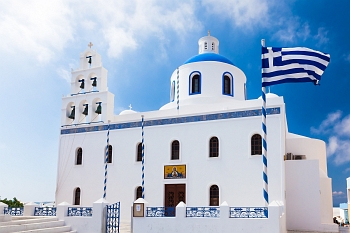 Whether they are here for religious purposes or purely for aesthetic pleasure, visitors of the Greek mainland and islands are amazed by the countless number of sites of religious devotion and major references to the divine. Visitors have the chance to see buildings and religious sites related to various dogmas and religions, which all co-exist in a state of ongoing dialogue and thus highlight the rare historic and cultural mosaic of Greece. Since antiquity the desire to embark on a journey for religious purposes has inspired Greeks and non-Greeks alike to make their way to religious sites throughout Greece. For millennia it has been a custom of the Greek people to express their religious sentiments, their deep faith and their reverence for God, a key characteristic of the Orthodox faith for 2000 years.
Whether they are here for religious purposes or purely for aesthetic pleasure, visitors of the Greek mainland and islands are amazed by the countless number of sites of religious devotion and major references to the divine. Visitors have the chance to see buildings and religious sites related to various dogmas and religions, which all co-exist in a state of ongoing dialogue and thus highlight the rare historic and cultural mosaic of Greece. Since antiquity the desire to embark on a journey for religious purposes has inspired Greeks and non-Greeks alike to make their way to religious sites throughout Greece. For millennia it has been a custom of the Greek people to express their religious sentiments, their deep faith and their reverence for God, a key characteristic of the Orthodox faith for 2000 years.
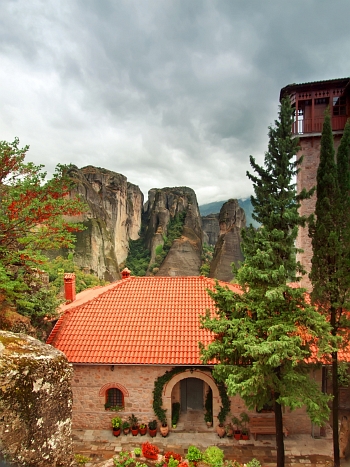 Some of Greece’s most important religious centers include the monastic community of Mount Athos, the impressive monasteries of Meteora, the Cave of the Apocalypse and the Monastery of John the Revelator on Patmos, places where the Apostle Paul preached and the pilgrim destinations of the Madonna (Panayia) of Tinos, the Panayia Soumela, the Panayia Ekatontapiliani etc.
Some of Greece’s most important religious centers include the monastic community of Mount Athos, the impressive monasteries of Meteora, the Cave of the Apocalypse and the Monastery of John the Revelator on Patmos, places where the Apostle Paul preached and the pilgrim destinations of the Madonna (Panayia) of Tinos, the Panayia Soumela, the Panayia Ekatontapiliani etc.
Religious restrictions concerning dressing don’t apply in all the churches and monasteries, but visitors are advised to wear dresses or skirts of appropriate length with sleeved blouses. Shorts are not always allowed on either men or women. Such restrictions apply in higher frequency on islands or remote places. Many monasteries offer visitors skirts and tops to slip over clothing that is not deemed appropriate. A typical example of this case is the Meteora monasteries. In Mount Athos, a World Heritage Site and peninsula in Northern Greece, applies a prohibition on entry for women. It is always a good idea to ask before you visit. Useful information can be given by a licensed travel agency or the locals and the hotel’s staff.
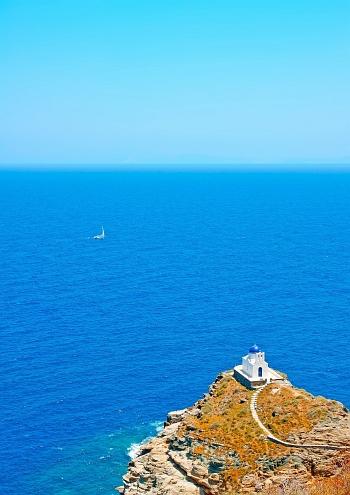 Such sites, with their divine immanence or their representation of preternatural forces, exist by the happiest of consequences side by side with the splendors of Greek nature. Every rock, cave, mountain and island - each of them offers a route to the divine. A religious trip offers a journey through a different side of Greece, through expressions of religious sentiment over the centuries. Such a journey is, in effect, a trip through time, a journey that everyone should undertake at some time. All through the year, Greece plays host to religious festivals with customs and traditions that have become deeply rooted to its customs over the centuries. These festivals, some local, others national, offer a chance for merrymaking and an escape from the dull monotony of everyday life. Fortunate indeed is the visitor who ends up as a spectator of such popular religious events.
Such sites, with their divine immanence or their representation of preternatural forces, exist by the happiest of consequences side by side with the splendors of Greek nature. Every rock, cave, mountain and island - each of them offers a route to the divine. A religious trip offers a journey through a different side of Greece, through expressions of religious sentiment over the centuries. Such a journey is, in effect, a trip through time, a journey that everyone should undertake at some time. All through the year, Greece plays host to religious festivals with customs and traditions that have become deeply rooted to its customs over the centuries. These festivals, some local, others national, offer a chance for merrymaking and an escape from the dull monotony of everyday life. Fortunate indeed is the visitor who ends up as a spectator of such popular religious events.
The greatest of all these celebrations in Greece is Easter, with its host of religious events and popular traditions each spring (in Corfu, Patmos, Skiathos, Leonidio, etc.). The “summertime Easter”, the Assumption of the Virgin Mary celebrated every year on the 15th of August, is similarly spectacular and especially popular in Greece. The weather at this time of year helps and many festivals take place across country. Many major Orthodox saints who play an important role in the Orthodox calendar (often patron saints of different cities), are also joyously celebrated on the day which is devoted to them, with major festivals or something on a smaller scale taking place in their honor.
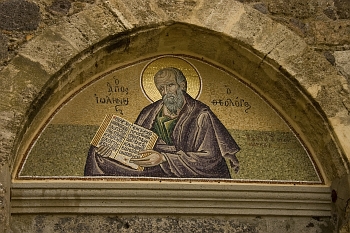 Thousands of visitors are interested in seeing Byzantine or post-Byzantine works of art with a religious theme, such as icons, murals, mosaics and cultural tributes from the past which pay testimony to dedication and tradition and to the tenacious relationship between art and religion. The major Byzantine museums in Athens, Thessaloniki, Veria, Ioannina and Kastoria will stun you with the richness and quality of their sublime collections of exhibits. Whether you come on a pilgrimage or to discover places and monuments that bring us closer to the divine aspect of our existence, come and visit these special places in Greece, where man once raised his eyes up to search for the Divine Light.
Thousands of visitors are interested in seeing Byzantine or post-Byzantine works of art with a religious theme, such as icons, murals, mosaics and cultural tributes from the past which pay testimony to dedication and tradition and to the tenacious relationship between art and religion. The major Byzantine museums in Athens, Thessaloniki, Veria, Ioannina and Kastoria will stun you with the richness and quality of their sublime collections of exhibits. Whether you come on a pilgrimage or to discover places and monuments that bring us closer to the divine aspect of our existence, come and visit these special places in Greece, where man once raised his eyes up to search for the Divine Light.
National Holidays and Festivals
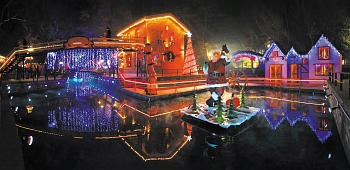 The nation's three most important holidays are Christmas, Easter and the Assumption of Virgin Mary. Christmas tends to be a private, family holiday, but lights and decorations adorn city squares across the country. Assumption Day is a major summer festival for many towns and islands. Easter weekend is perhaps the most flamboyant of all holidays; religious processions on Good Friday and the following Saturday evening culminate in exuberant fireworks at midnight. Contrary to most national holidays in other countries, Independence Day in Greece is a very somber holiday. There is a school flag parade in every town and village around Greece, as well as a big armed forces parade in Athens. Although not an official holiday, pre-Lenten carnival -or apókries- is a major celebration in cities throughout the country, with Patras hosting the Greece's largest and most famous events. Carnival season comes to an extravagant ending the weekend before Lent begins, with costumes, float parades, and various regional traditions.
The nation's three most important holidays are Christmas, Easter and the Assumption of Virgin Mary. Christmas tends to be a private, family holiday, but lights and decorations adorn city squares across the country. Assumption Day is a major summer festival for many towns and islands. Easter weekend is perhaps the most flamboyant of all holidays; religious processions on Good Friday and the following Saturday evening culminate in exuberant fireworks at midnight. Contrary to most national holidays in other countries, Independence Day in Greece is a very somber holiday. There is a school flag parade in every town and village around Greece, as well as a big armed forces parade in Athens. Although not an official holiday, pre-Lenten carnival -or apókries- is a major celebration in cities throughout the country, with Patras hosting the Greece's largest and most famous events. Carnival season comes to an extravagant ending the weekend before Lent begins, with costumes, float parades, and various regional traditions.
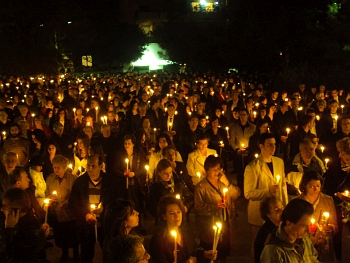 In addition to nation-wide holidays and celebrations, many regions have their own festivals commemorating various historical events, local patron saints or wine harvests. Note that the Greek Orthodox Church uses a different method to determine the date of Easter from the Roman Catholic and Protestant churches. Therefore, Greek Orthodox Easter and - derived from that - Holy Week and Pentecost usually fall one or two weeks later than their Roman Catholic and Protestant counterparts, but they do sometimes coincide.
In addition to nation-wide holidays and celebrations, many regions have their own festivals commemorating various historical events, local patron saints or wine harvests. Note that the Greek Orthodox Church uses a different method to determine the date of Easter from the Roman Catholic and Protestant churches. Therefore, Greek Orthodox Easter and - derived from that - Holy Week and Pentecost usually fall one or two weeks later than their Roman Catholic and Protestant counterparts, but they do sometimes coincide.
According to Greek Law, every Sunday of the year is a public holiday. In addition, there are four obligatory, official public holidays: March 25th (Greek Independence Day), Easter Monday, August 15th (Assumption of the Holy Virgin) and December 25th (Christmas). Two more days, May 1st (Labor Day) and October 28th (Ohi Day), are regulated by law as optional but it is customary for employees to be given the day off. There are, however, more public holidays celebrated in Greece than are announced by the Ministry of Labor each year as either obligatory or optional. The list of these 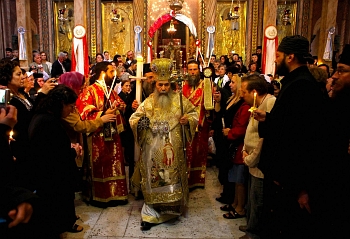 non-fixed National Holidays rarely changes and has not changed in recent decades, giving a total of eleven National Holidays each year.
non-fixed National Holidays rarely changes and has not changed in recent decades, giving a total of eleven National Holidays each year.
In addition to the National Holidays, there are Public Holidays that are not celebrated nationwide, but only by a specific professional group or a local community. For example many municipalities have a Patron Saint, also called 'Name Day', or a 'Liberation Day' during which it is customary for schools to have a day off. Notable festivals include Patras Carnival, the Athens Festival and various local wine festivals. The city of Thessaloniki is also home to a number of festivals and events. The Thessaloniki International Film Festival is one of the most important film festivals in Southern Europe.
Gastronomy
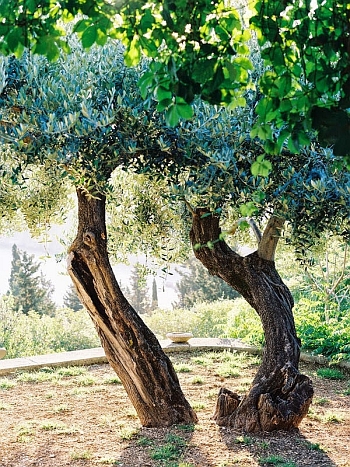 Greek cuisine has four secrets: top quality fresh ingredients, correct use of herbs and spices, the famous Greek olive oil and elegant simplicity. One of the authentic cultural elements of a region is its gastronomy. The distinctiveness of the 'kitchen taste' (gustation) is frequently times associated with the quality characteristics of its society, while revealing information concerning its cultural and economic history. At the same time, gustation seems to be a way of communicating. A way for someone to 'speak' to the heart of someone else.
Greek cuisine has four secrets: top quality fresh ingredients, correct use of herbs and spices, the famous Greek olive oil and elegant simplicity. One of the authentic cultural elements of a region is its gastronomy. The distinctiveness of the 'kitchen taste' (gustation) is frequently times associated with the quality characteristics of its society, while revealing information concerning its cultural and economic history. At the same time, gustation seems to be a way of communicating. A way for someone to 'speak' to the heart of someone else.  Greek gastronomy has a recorded history of around 4,000 years, with especial characteristics based on pure and unique quality goods produced locally. In fact, it was Archestratos who wrote the first cookbook in history (330 BC).
Greek gastronomy has a recorded history of around 4,000 years, with especial characteristics based on pure and unique quality goods produced locally. In fact, it was Archestratos who wrote the first cookbook in history (330 BC).
The traditional Greek diet is very Mediterranean, utilizing vegetables, herbs and grains native to the healthy Mediterranean biome, which is epitomized by Cretan dishes. Being a highly maritime nation, the Greeks incorporate plenty of seafood into their diet. The country is also a major producer and consumer of lamb; beef, pork, and especially chicken are also popular. Olive oil is a staple in Greek cooking, while lemons and tomatoes are very common ingredients. Bread and wine are always served at the dinner table. Other significant ingredients are cheese, eggplant (aubergine), zucchini (courgette) and yogurt. The cuisine in Greece can be radically different from what is offered in Greek restaurants around the world. 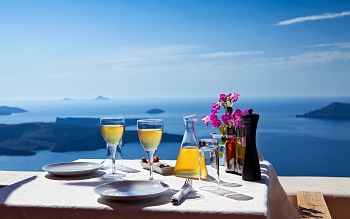
Orektika is the formal name for appetizers and is something you should expect plenty of when experiencing Greek cuisine. Dips are served with a bread loaf or pita bread. In some regions, dried bread (paximadhi) is softened in water. Some of the most famous local dishes are moussaka (a rich oven-baked dish of eggplant, minced meat, tomato and white sauce), pastitsio (a variety of lasagna), stifado (pieces of meat and onion in a wine and cinnamon stew), spetzofai (braised sausage with pepper and tomatoes, a hearty dish originally from the Mt. Pelion region), saganaki (fried semi-hard cheese), paidakia (grilled lamb chops), fasolada (bean soup), spanakotyropita (spinach and cheese pie) and of course tzatziki.
 Fried potatoes (often listed on menus as chips) are a very common Greek side dish, found almost everywhere. They can be very good when freshly made and served hot. Certain dishes can be traced back to ancient Greece like skordalia (a garlic mashed potato dip which is usually served with deep fried salted cod), lentil soup, retsina (white or rosé wine sealed with pine resin) and pasteli (candy bar with sesame seeds baked with honey). Greek salad (usually referred to as 'country salad', or 'Choriatiki') is a mix of tomatoes, cucumber, feta cheese and onion – all sliced – plus some olives and occasionally green bell pepper or other vegetables, usually garnished with oregano. Traditionally it is dressed only with olive oil; vinaigrette or lettuce are added only in the most tourist-oriented restaurants.
Fried potatoes (often listed on menus as chips) are a very common Greek side dish, found almost everywhere. They can be very good when freshly made and served hot. Certain dishes can be traced back to ancient Greece like skordalia (a garlic mashed potato dip which is usually served with deep fried salted cod), lentil soup, retsina (white or rosé wine sealed with pine resin) and pasteli (candy bar with sesame seeds baked with honey). Greek salad (usually referred to as 'country salad', or 'Choriatiki') is a mix of tomatoes, cucumber, feta cheese and onion – all sliced – plus some olives and occasionally green bell pepper or other vegetables, usually garnished with oregano. Traditionally it is dressed only with olive oil; vinaigrette or lettuce are added only in the most tourist-oriented restaurants. 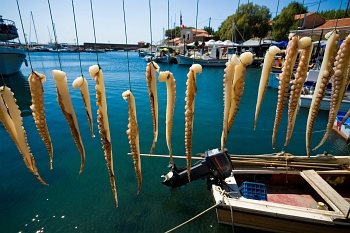 Mezés (μεζές) is a collective name for a variety of small dishes with various dips such as tzatziki (made of strained yogurt, olive oil, garlic and finely chopped cucumbers and dill or mint), grilled octopus and small fish, feta cheese, dolmades (rice, currants and pine kernels wrapped in vine leaves), various pulses, olives and cheese. These dishes are typically served and suit traditionally with wines or anise-flavored liqueurs as ouzo or homemade tsipouro. With its extensive coastline and islands, Greece has excellent seafood. Try the grilled octopus and the achinosalata (sea-urchin eggs in lemon and olive oil). By law, frozen seafood must be marked as such on the menu. Fresh fish, sold by the kilo, can be very expensive; if you're watching your budget, be sure to ask how much your particular portion will cost before ordering it.
Mezés (μεζές) is a collective name for a variety of small dishes with various dips such as tzatziki (made of strained yogurt, olive oil, garlic and finely chopped cucumbers and dill or mint), grilled octopus and small fish, feta cheese, dolmades (rice, currants and pine kernels wrapped in vine leaves), various pulses, olives and cheese. These dishes are typically served and suit traditionally with wines or anise-flavored liqueurs as ouzo or homemade tsipouro. With its extensive coastline and islands, Greece has excellent seafood. Try the grilled octopus and the achinosalata (sea-urchin eggs in lemon and olive oil). By law, frozen seafood must be marked as such on the menu. Fresh fish, sold by the kilo, can be very expensive; if you're watching your budget, be sure to ask how much your particular portion will cost before ordering it.
 Greek desserts are characterized by the dominant use of nuts and honey. For dessert, ask for baklava, tissue-thin layers of pastry with honey and chopped nuts; or galaktoboureko, a custard pie similar to mille feuille. Other pastries are also worth tasting. Another must-try is yogurt with honey: yogurt varieties in Greece are really different from what you used to see at Danone stores and you must taste it to really understand the difference. Fruit such as watermelon are also a common summertime treat.
Greek desserts are characterized by the dominant use of nuts and honey. For dessert, ask for baklava, tissue-thin layers of pastry with honey and chopped nuts; or galaktoboureko, a custard pie similar to mille feuille. Other pastries are also worth tasting. Another must-try is yogurt with honey: yogurt varieties in Greece are really different from what you used to see at Danone stores and you must taste it to really understand the difference. Fruit such as watermelon are also a common summertime treat.
For breakfast, head to local bakeries (fournos) and try fresh tiropita (cheese pie), spanakopita (spinach pie) or bougatsa (custard filled pie). Country Bread 'Choriatiko psomi' a traditional, crusty village type bread, is a household staple and very tasty on its own. All of the aforementioned baked goods are delicious and popular among Greeks for a quick breakfast. Each bakery does own rendition and you are never disappointed. The nutritional culture of the Greeks has traditionally added an extroverted social dimension to the table, combining gustative satisfaction with recreation and communication, and thus maintaining even today some overtones from ancient feasts.

